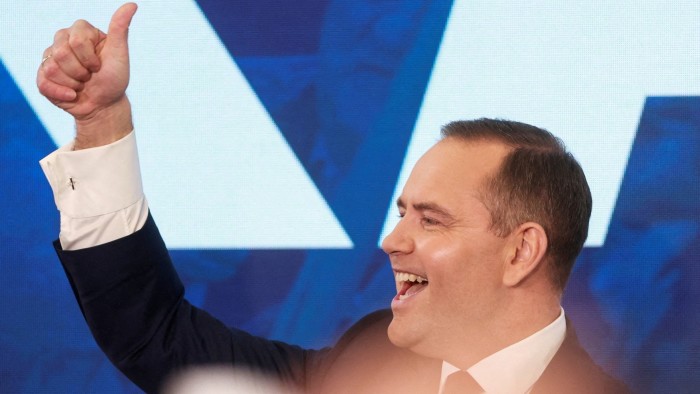Share this @internewscast.com
Poland’s shift towards a more conservative stance has jeopardized the European Union’s trade goals and raised doubts over the allocation of billions of euros intended for Warsaw, according to officials. This turn of events has also fueled an increasing trend of Euroscepticism in central Europe.
The surprising win of right-wing nationalist Karol Nawrocki in Poland’s presidential election has unsettled Brussels. There are concerns that this could severely damage the pro-EU government led by Premier Donald Tusk, hinder needed reforms to unlock EU funds, and lead Warsaw to obstruct a significant trade agreement with the South American Mercosur nations.
Nawrocki, who has a background as a former football hooligan and no prior political experience, ran his campaign with the slogan “Poland First,” openly criticizing EU stances on climate change, Ukraine, and various social policies.
“Let’s help others, but let’s take care of our own citizens first,” Nawrocki, who was backed by US President Donald Trump, said on the campaign trail.
Orsolya Raczova, central and eastern Europe analyst at Eurasia Group, said Tusk’s reform agenda would now “be paralysed . . . Nawrocki will prevent him from implementing an overhaul of the judiciary in line with EU demands”.
“Nawrocki will join other sovereigntists leaders led by Hungarian Prime Minister Viktor Orbán in resisting Brussels,” Raczova added.
Tusk’s election as prime minister in October 2023 was seen by Brussels as a welcome return to a pro-EU government in Poland, the bloc’s sixth-largest economy and most important eastern flank member, after eight years of Eurosceptic rule.

Brussels said the previous government led by the rightwing Law and Justice (PiS) party, which nominated Nawrocki, endangered rule of law and the independence of the country’s judiciary, resulting in the freezing of billions in EU funds.
Following a commitment from Tusk’s government to carry out reforms that would strengthen the independence of the judiciary, the European Commission in 2024 unlocked €137bn of EU funds earmarked for Poland.
Brussels has to date disbursed more than €20bn of Poland’s €60bn share of the EU’s post-pandemic recovery fund, as well as close to €7bn out of €76.5 billion in regular EU regional funds, on the proviso of changes such as amending a controversial disciplinary regime for judges, and reinstating all judges that were subject to disciplinary measures under the previous government.
However these changes were not signed into law, due to outgoing president Andrzej Duda’s vetoes — something his successor has vowed to continue.
Senior EU officials told the FT that Nawrocki’s vow to stop those reforms being passed into law again called into question Warsaw’s continued commitment to strengthening the rule of law, which underpins the flow of EU cash. Nawrocki assumes office in August.
“Everything was built on the idea that Poland was going to reform fully when the president would be aligned with Tusk, and if not things would be going sideways . . . Now things are going sideways,” said Jakub Jaraczewski, a research co-ordinator at Democracy Reporting International, a Berlin-based NGO.
While Poland’s president has limited executive power, the office can block legislation passed by parliament and nominate key state officials such as the head of the central bank. Tusk would need a three-fifths majority to bypass a Nawrocki veto — a level he cannot reach without votes from PiS.
Daniel Freund, a Green member of the European parliament, said the commission had unfrozen the funds to Poland “prematurely”.
“The release of the funds was subject to the submission of a plan instead of waiting until the reforms actually take effect,” Freund told the FT.
He urged the commission to take action if the reforms were not passed. “The first step would be to put pressure on the Polish government to implement the necessary measures,” he said. “The moment the president takes real action and doesn’t sign them, the second step would be to freeze the funds.”
A spokesperson for the commission told the FT: “We cannot speculate about future decisions of the Polish President-elect.”
“We are confident that the reforms that have been started by the polish government will be pursued and will be continued,” the spokesperson said, adding Brussels would “seek good co-operation” with the president-elect.
In addition to Nawrocki’s veto ability, his election will severely weaken Tusk’s power and is expected to force him to avoid potentially unpopular policies, such as supporting the Mercosur trade deal. Polish farmers fear that cheaper food imports from South America will damage competition and lower safety standards in the EU. The Polish farmers’ party is in Tusk’s coalition.
With France also against ratifying the EU’s largest ever trade deal, and Ireland, Austria and the Netherlands sceptical, Poland could help create a blocking minority.
Nawrocki will join Orbán and Slovakia’s Prime Minister Robert Fico as key anti-EU voices in the region. His victory also comes ahead of a parliamentary election in the Czech Republic in October where populist Andrej Babiš leads in opinion polls, raising concerns of a growing anti-Brussels feeling among voters in the bloc’s east.
Officials said that while Nawrocki’s campaign also criticised EU financial and military support to Ukraine, they did not expect that rhetoric to result in concrete changes to Poland’s strong pro-Kyiv positioning, given widespread condemnation of Russia’s war in the country.
But other domestic issues related to pro-EU policies would suffer, officials and analysts said.
“This election outcome will likely mean that none of the Tusk government’s central projects can be implemented . . . [and] undermine pro-European and democratic Poland,” said René Repasi, a German SPD member of the European parliament. “This will now make it difficult for the Tusk government to reconstruct the rule of law in this important EU member state.”
But across the EU’s Eurosceptic parties, others celebrated. Matteo Salvini, Italy’s far-right deputy prime minister, hailed the “great news from Poland”.
Nawrocki had been “rewarded by the free and democratic vote of Polish citizens with all due respect to the bureaucrats in Brussels and for all those media that for days have called him extremist”, Salvini wrote on Monday.
Additional reporting by Amy Kazmin in Rome and Andy Bounds in Brussels




